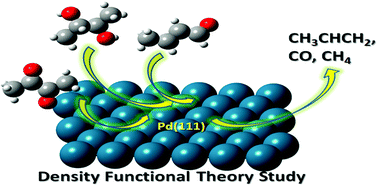First-principles study on the gas-phase decomposition of bio-oil oxygenated compounds over the palladium catalyst surface†
Abstract
Unprocessed bio-oils derived from the thermochemical conversion of lignocellulosic biomass suffer from low energy density primarily due to the presence of high amounts of oxygen functional groups. Therefore, the elimination of oxygen atoms over a suitable catalyst surface is viewed as one of the appropriate mechanisms for elevating the quality of bio-oils. Here, in this computational study, three oxygenated bio-oil model compounds, namely, 2-butenal, butan-2,3-diol, and butan-2,3-dione were considered as the representative compounds of the oxygenated catalogue of bio-oils. The decomposition mechanisms of these model compounds along with microkinetic modelling were studied over a palladium catalyst surface to produce low or no oxygen-containing products under the density functional theory (DFT) framework. Propene and methane were observed as the major products in the decomposition processes of 2-butenal and butan-2,3-dione, respectively. Butan-2,3-diol showed no major products due to high barriers. The increase in temperature was observed to be beneficial for improving the reaction rate constants; however, in many cases, the elevation of temperature shifted the equilibrium towards the reactants. CO acted as one of the major inhibitors due to the decarbonylation reaction of aldehydes.



 Please wait while we load your content...
Please wait while we load your content...